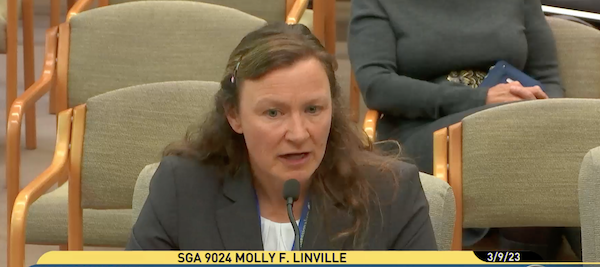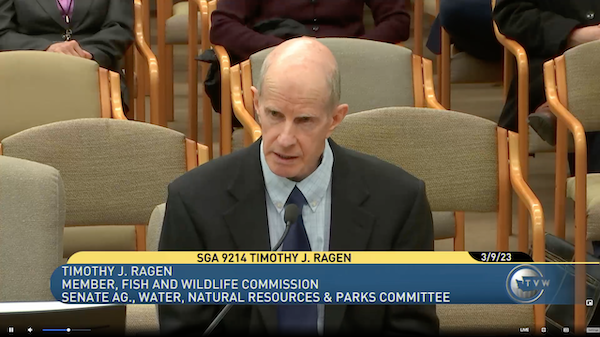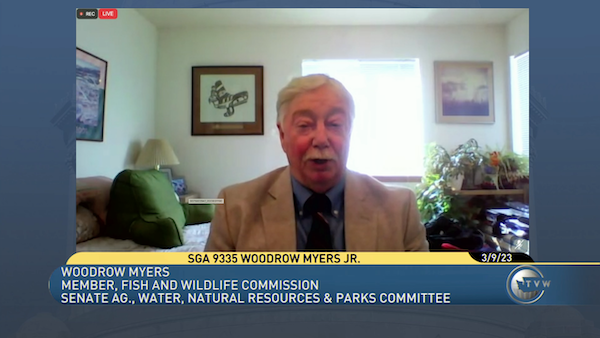
3 WDFW Commissioners Appear Before Senate Committee; 3 More Due
Three Washington Fish and Wildlife Commissioners were told that senators would work to confirm them following a public hearing on their appointments this afternoon, while another trio are due before the Agriculture, Water, Natural Resources & Parks Committee next week.
Vice Chair Molly Linville and Commissioner Tim Ragen and new guy on the hot seat Woody Myers detailed their qualifications to be on the citizen panel overseeing WDFW policies and took questions from senators, while Jim Anderson, John Lehmkuhl and Melanie Rowland will do so next Monday before recommendation votes on all six later in the week.

The hearings, done under an oath of truthfulness, provide a read on where commissioners are at in terms of their views of fish and wildlife management and make for interesting listening. And on the flip side, fish and wildlife interests sometimes funnel questions to senators to pointedly ask of them.
Sen. Shelly Short (R-7) inquired of Linville, a Douglas County rancher, what she thought of the science produced by the agency, and Linville responded that she felt it was “strong” and there were “strong scientists” working on it. She related how when she was a federal and private wildlife biologist, she got her permits from WDFW, who were “the experts in Washington.”
Linville also differentiated between sciences, saying that in chemistry, when you mix certain materials you’re sure to get a very specific reaction, but in the biologic sciences she indicated there’s more nuance and she likened that expert advice from WDFW staff to “guidance in our decision making.”
Asked by Sen. Kevin Van De Wege (D-24) if the commission needed its own staff of scientists, Linville said for her personally it was “a resounding no.” She said it would be “disheartening” for WDFW biologists and said that if decisions had to wait for the absolute best available science, none would be made and it would lead to “analysis paralysis.”

Van De Wege followed up with how she thought wolf management is going, to which Linville said in Northeast Washington it was a B to B-plus and “better than any other state in the nation.”
“We have other states asking us how we’re doing so well,” she added.
That said, she said there was room for improvement working with locals in wolf country.
Sen. Short asked her where WDFW was at with its population status review on Canis lupus and Linville said it was due in summer but should have been out awhile ago. Staffing levels and a sidetracking request from the Governor’s Office to do rulemaking around wolf-livestock conflict set it back.
Ragen, a retired marine mammal manager who lives in Anacortes, was asked by Sen. Keith Wagoner (R-39) how well Washington was dealing with pinniped problems with salmon, and he replied that the MMPA’s success has created challenges with seal and sea lion numbers and he was on task forces looking at pinniped predation at Bonneville and Willamette Falls.
“I voted that we might have to take marine mammals in some cases because the greater issue was the recovery of those salmon stocks,” Ragen said.

Sen. Sharon Shewmake (D-42) brought up birth control used to reduce African elephant birth rates and asked what Ragen thought of that in terms of controlling seal and sea lion numbers. He said artificial birth control had been looked at and it should be in managers tool kit and considered, but it was also complicated by the birth patterns of the pinnipeds.
Van De Wege took a moment to remind the committee of a study that found pinnipeds eat more salmon than sport, tribal and commercial fishermen catch combined.
Sen. Judy Warnick (R-13), who noted that family members of hers hunt, asked Ragen his thoughts on deer, elk and spring bear hunting. He replied that he was trying to encourage a melding of marine mammal and wildlife biology and management to essentially expand how many parameters are used to judge how well, say, an elk herd is doing by looking at more than just its age and sex structure.
“We need more information in order to assess status,” Ragen said.
Referencing the importance of WDFW and the commission’s mandate to “preserve, protect, perpetuate and manage” wildlife, he added, “Do we understand actually what those trends and are we sure we are being sufficiently careful and thorough that we can tell the public that yes, we are doing a good job of maintaing the health and stability of these populations?”
As for the spring black bear hunt, Ragen said he had heard bruin population estimates from 30,000 to 50,000, and when he asked WDFW for the basis of that estimate, he said he didn’t get a clear answer how it was arrived at.
In one of his first meetings on the commission last year, in early March 2022 Ragen and fellow commissioners were told by WDFW biologists they estimated the statewide population was actually 20,000.
Ragen said he isn’t against hunting but wants to ensure WDFW is confident it knows what it’s doing with hunted populations and not putting them at extra risk. He said he tries to keep in mind that he’s representing three different constituencies: hunters and nonhunters; the next generation; and the hunted population itself.
Asked by Van De Wege what he thought about gillnets, Ragen’s response would be music to the Sequim angler’s ears: “Gillnets catch everything that runs into them” and lead to additional dropout mortality, but they are a tool that could be used at specific times and places to catch specific fish exclusively, he said.
That led to a discussion about taking a hard look at managing fisheries under maximum sustained yield.
“What it does, what I think a lot of people haven’t understood, is that paradigm causes you to reduce a pristine stock by about 65 percent, roughly … In order to get that maximum sustained yield, you have to reduce that pristine stock by a lot. And then you have to ask, What is the impact of that on that stock and also on the ecosystem of which it’s a part?”
Pointed to “optimum yield” manageement, he said, “At some point we have to put some limits on how much we catch.”
Even as Van De Wege gave Linville a do-not-confirm recommendation at her hearing last year, he promised her and Ragen “we will work very hard to get you both confirmed this year.”
As for Myers, he detailed how he was stepping out of retirement even after working 10 years longer as an ungulate researcher than he had to at WDFW before retiring. He said growing up in an Air Force family gave him a strong sense of duty and he wanted to assist the commission by bringing science into policy decisions.
Sen. Short wanted to know his opinion on what it would take to help whitetail deer in her neck of the woods, Northeast Washington, the state’s flagtail heartland, thrive. Myers said that from a broad perspective it boiled down to quality habitat. He said that reduced farmed acreage and less hay growing had cut into the region’s productivity for deer. He also spoke broadly about whitetails’ dependency on early seral – or recently logged – landscapes and the dawning importance of summer range over winter range, both of which combine to produce the groceries mama deer really, really need over their dry herdmates.

Van De Wege asked whether he thought the “reintroduction” of wolves was helping or hurting ungulates, to which Myers hemmed and hawed, partially because it occurred towards the end of his career and he didn’t have a lot of data of his own to refer to. He did say, though, that of 150 to 160 collared does he had been following, none were killed by wolves and the top two causes of mortality were cougars and domestic dogs, followed distantly by coyotes and bobcats. But he said he knows deer are being killed by wolves.
A WDFW-UW Predator-Prey Project scat study bears that out, showing that whitetails represent the largest portion of wolves’ diet in winter in Northeast Washington, just over 50 percent, followed by moose at around 35 percent. In summer, whitetails represent about 30 percent of wolves’ diet, second to moose.
Asked about Washington salmon management, Myers said he wasn’t yet up to speed on that – earlier he’d said that if Ragen was drinking from one fire hose, as a just-appointed commissioner he was guzzling from three at once – but was putting his faith in WDFW staffers working on it for the time being.
“We will work this session to get you confirmed,” stated Van De Wege.
Sen. Christine Rolfes (D-23) lauded the three commissioners for their “diverse expertise and personalities.”
After this coming Monday’s public hearings on Anderson, Lehmkuhl and Rowland, the appointments of all six commission members are slated for a recommendation vote to the full Senate next Thursday, March 16.
Commissioners can serve without confirmation by the Senate.

